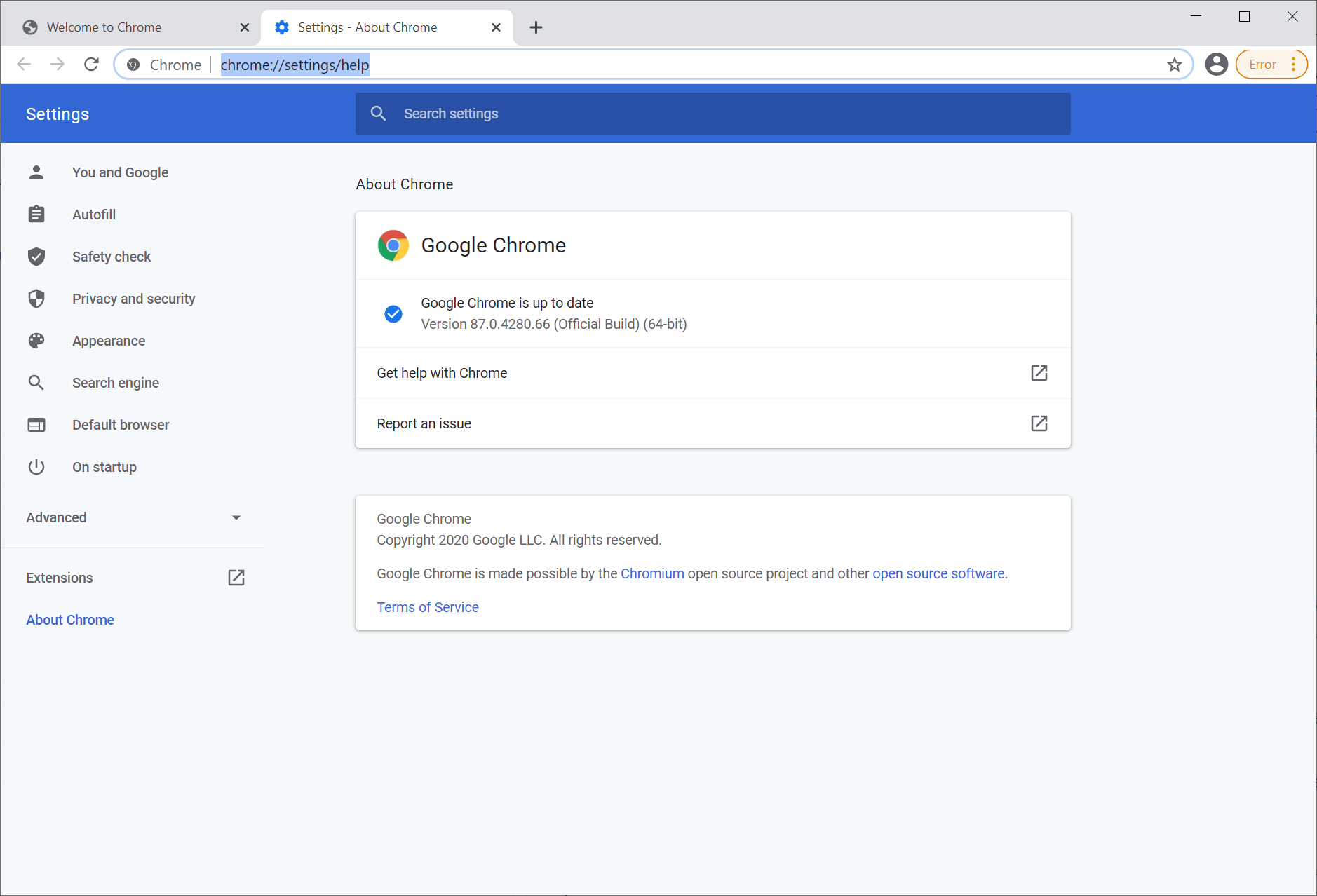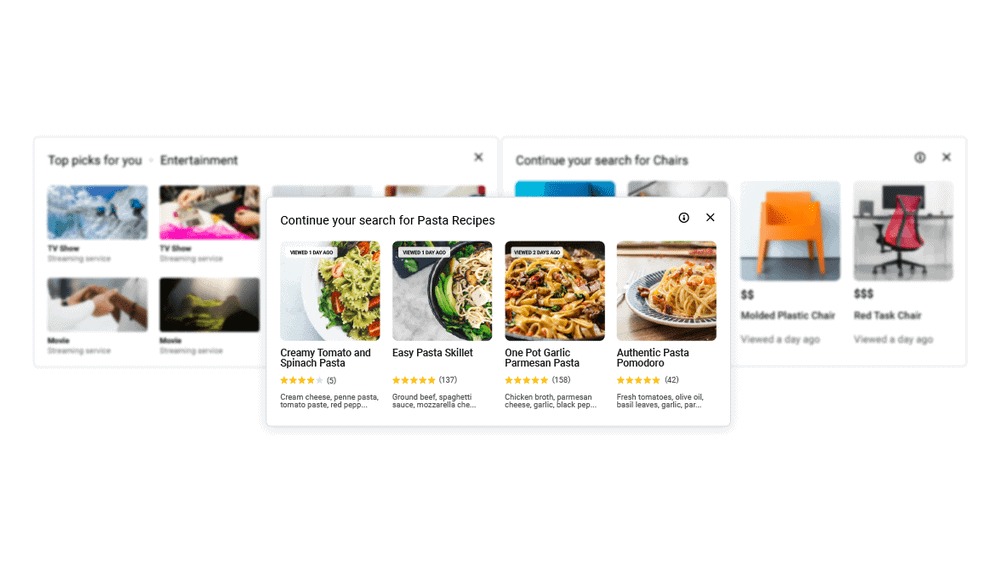Chrome 87 launches with tab search, performance improvements and new Chrome Actions feature

Google published Chrome 87 Stable to the public on November 17, 2020. The new version of the company's Chrome web browser is a security and feature update. The update is available already, and while Google rolls it out over time, users on the desktop may run a manual check for updates to get it right away.
Just load chrome://settings/help in a desktop version of Google Chrome to check for updates manually. The page displays the currently installed version of the browser as well.
Google Chrome 87
Google promises that the performance gains that it implemented in this version of Google Chrome are "the largest [..] in years". The company states that the browser's new tab prioritization feature reduces CPU usage "by up to 5x" and that it extends battery life by "up to 1.25 hours". Additionally, Google states, Chrome starts "up to 25% faster" and loads pages "up to 7 percent faster" while using less power and RAM.
The Android version of Chrome benefits from the same back and forward navigation feature that Google implemented in the desktop versions previously that makes the actions near instant.
Tab Search
Tab Search, another feature that we reviewed earlier this year when it landed in development versions of Google Chrome, will be introduced in all Chrome desktop versions starting with this release. Google decided to roll it out to Chrome on Chromebooks first before it will be available on other desktop platforms the browser runs on.
The search finds tabs quickly, even across browser windows. It is useful for Chrome users who have lots of tabs open all the time as Chrome is less than ideally suited for handling large numbers of tabs.
Google started to address tab overload in Chrome, when tabs are indistinguishable from one another and don't get added anymore to the tab bar, by adding experimental features such as tab groups or scroll icons. Tab Search is yet another addition in this regard.
Chrome Actions
Chrome Actions is yet another new feature in the browser. Basically, what it does is add quick actions to the address bar that trigger when the intent of the user (based on the input) suggests it. A user who enters "delete history" may get the "clear browsing data" action suggested, and a user entering "edit password" may get a direct link to the password manager of the browser.
The following actions are supported by this initial release:
- Clear Browsing Data - type ‘delete history’, ‘clear cache ‘ or ‘wipe cookies’
- Manage Payment Methods - type ‘edit credit card’ or ‘update card info’
- Open Incognito Window - type ‘launch incognito mode‘ or ‘incognito’
- Manage Passwords - type ‘edit passwords’ or ‘update credentials’
- Update Chrome - type ‘update browser’ or ‘update google chrome’
- Translate Page - type ‘ translate this’ or ‘ translate this page’
As is the case with many of these new features, they are rolled out gradually to all users.
Chrome users who don't want to wait for the feature can enable the following experimental features to unlock it right away:
- Load chrome://flags/#omnibox-pedal-suggestions and set it to Enabled.
- Load chrome://flags/#omnibox-suggestion-button-row and set it to Enabled.
- Restart Google Chrome.
Cards on the new Tab Page

Chrome's default tab page will feature cards soon. Cards are designed to help users go back to previously visited content and related content, and Google notes that this helps save time.
The new feature focuses on a few areas such as cooking or shopping in the beginning, but Google has plans to expand it to other areas such as entertainment in the coming year. The feature will roll out over the coming weeks.
Other changes
- FTP support is being removed for 50% of Chrome users in Chrome 87, and for all users in Chrome 88. Users may re-enable FTP support in Chrome 87 by launching the browser with the parameter --enable-features=FtpProtocol. The parameter won't work anymore in Chrome 88 and newer.
- HTTP ports 5060 and 5061 are blocked to mitigate the Slipstream attack. "The Slipstream attack is a kind of cross-protocol request forgery which permits malicious internet servers to attack computers on a private network behind a NAT device."
- Cookie Store API that "exposes HTTP cookies to service workers and offers an asynchronous alternative to document.cookie".
- Local Font Access to give "web applications the ability to enumerate local fonts and some metadata about each".
- Pan and tilt support for Camera.
- Streams API support. It provides "ubiquitous, interoperable primitives for creating, composing, and consuming streams of data".
- cross-origin isolation to use "origin instead of site as agent cluster key for cross-origin isolated agent clusters". Introduces cross-origin isolated permission, and self-crossOriginIsolated returning.
You can check out other major changes on the Chrome Status website, or check out the entire, huge, log here.
Now You: What is your take on these changes and improvements?



















That Cookie Store API doesn’t sound good. I block service workers by default, so I should be okay, but most people don’t.
Is there any change in address bar’s keylogger behaviour?
Do some searching and you will find long ago the Chromium project lead developer closed many, many tickets requesting changes to the behavior of that obnoxious bouncing url bar. The resolution was essentially, “Never.” The URL bar is the most important part of Chromium’s data collection.
In Google’s words, paraphrased, Chrome is browser based user ad data collection software.
Thanks for the Chrome Status web site link. It sure beats scanning the log file. I run Version 87.0.4280.66 (Official Build) beta (64-bit) with several experimental flags enabled. It is encouraging to me to see Chrome aggressively continue to improve Chromium in their Windows Chrome versions in ways I find very useful.
The new Chromium performance changes seem to be related to MS aggressively pushing Edge, and focusing on performance. With the native integration into Windows, MS has an advantage there.
I am sorry but I can’t see this as a realistic scenario. Chrome’s power is google’s services. Google will make sure they work better in chrome. MS and Edge can’t compete Chrome to the masses with bing and with youtube inferior performance.